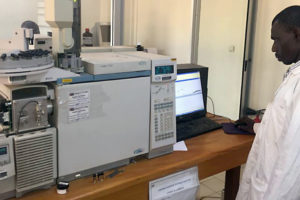IAEA and FAO Help Burkina Faso and Algeria to Enhance Food Safety & Security

The IAEA and the Food and Agriculture Organization of the United Nations (FAO) cooperate in supporting food safety and food quality programmes around the world to address food hazards, food fraud and advise countries on food irradiation. Among the beneficiaries of this programme have been Burkina Faso and Algeria. To celebrate World Food Safety Day, we are drawing attention to the importance of nuclear techniques in monitoring food safety. “Safe food today for a healthy tomorrow” – this year’s theme – recognizes how safe food contributes to a healthy life, economy, planet and future.
Enhanced food safety capabilities in Burkina Faso
Tiny but oil- and vitamin-rich sesame seeds have become a staple of Burkina Faso’s economy – creating jobs and generating income. After cotton, the edible seeds that grow in pods have become the West African country’s second most exported agricultural product. This sprouting success in the last decade has been sustained with the help of Burkina Faso’s National Public Health Laboratory (LNSP), supported by the IAEA and FAO, through their Joint Cenre on Nuclear Techniques in Food and Agriculture.
Enhancing food safety analytical capabilities in Algeria
Laboratories in Algeria have received the support to enhance their analytical capabilities for the detection of chemical hazards, including antimicrobial and pesticide residues in a range of food, from poultry and eggs to dates and honey. Algeria was the world’s sixth leading exporter of dates, worth approximately US $129 million in 2020.
Through the IAEA’s technical cooperation programme and in partnership with FAO, staff of the Algerian National Institute for Agronomic Research (INRAA) and the National Institute of Veterinary Medicine (INMV) have been trained in methods of analysis and supported with the required analytical equipment. These institutions are now equipped to contribute towards consumer protection and the trade of agricultural products.

